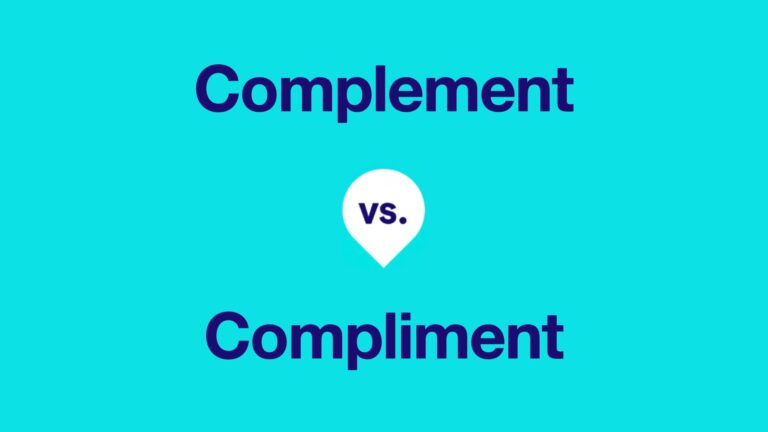Imagine this scenario: You’ve just delivered a big presentation. One colleague says, “Your visuals really complemented your speech,” while another says, “I must compliment you on your delivery—it was excellent.” Both comments feel positive, but they mean different things. Misusing complement and compliment can change the sense of what you’re trying to say—and in formal writing or standardized tests, it can cost you points.
These two words are homophones—they sound almost identical—but their meanings and uses are distinct. Once you understand the difference and learn a few simple tricks, you’ll never hesitate between them again.
At a Glance
| Word | Part of Speech | Meaning | Example |
| Complement | noun/verb | Something that completes, enhances, or goes well with something else | “The new curtains complemented the room’s decor perfectly.” |
| Compliment | noun/verb | An expression of praise or admiration | “She received a compliment on her well-written essay.” |
How to Use Complement
Think of complement (with an “e”) as something that completes or enhances another thing. It’s not about flattery—it’s about balance, fit, or harmony.
Complement As a verb:
- The chef’s choice of wine complements the flavors in the dish.
- Strong teamwork can complement individual talent to achieve a goal.
- The software’s new feature complements existing tools.
Complement As a noun:
- The red scarf was the perfect complement to her outfit.
- In music, the harmonies act as a complement to the main melody.
- Light and shadow provide a complement that brings the painting to life.
Synonyms for complement:
enhance, complete, match, pair with, accompany, go well with.
⚠️ Standardized test tip: Complement often appears in reading comprehension or sentence completion questions where two elements are shown to work together or balance each other. Recognizing the nuance can help you avoid traps.
How to Use Compliment
Compliment (with an “i”) is all about praise. When you compliment someone, you’re expressing admiration or approval.
Compliment As a verb:
- She complimented her teammate on their innovative approach.
- Teachers often compliment students on improvements in writing or math.
- The manager complimented the staff for meeting tight deadlines.
Compliment As a noun:
- He received several compliments after his keynote speech.
- The article included a glowing compliment about her research.
- A sincere compliment can brighten someone’s day.
Synonyms for compliment:
praise, commendation, flattery, kudos, admiration, accolade.
Bonus usage: In business or hospitality, “complimentary” can mean free of charge, e.g., “Guests receive a complimentary breakfast.” Be careful not to confuse this with “complementary,” which means “matching or enhancing.”
Common Confusions and Exceptions
- The two words are rarely interchangeable. The main overlap comes in formal expressions like “a complimentary arrangement that complements the main system,” but even here, each word retains its distinct meaning.
- Both words can function as nouns or verbs, but their core concepts never cross: one enhances, the other praises.
- In standardized tests (SAT, GRE, GMAT), sentence completion questions often try to trick you by placing one of these words where the other almost fits grammatically. Focusing on the meaning is always the safe bet.
Memory Tricks
- Complement = Enhances / Completes → both have an “e.” Think: “e for enhance.”
- Compliment = Praise → both have an “i.” Think: “I admire you.”
- Tip for testing: Ask yourself—am I describing something that works well with another thing, or am I expressing praise? That usually points directly to the correct word.
Extended Examples
Complement:
- “The soft lighting in the room complements the minimalist design perfectly.”
- “Her quiet demeanor complements his energetic personality in teamwork.”
- “The new curriculum complements existing courses, providing a balanced learning experience.”
Compliment:
- “He received a compliment from the professor for his insightful essay.”
- “The client’s compliments made the team feel valued and appreciated.”
- “She graciously complimented her colleague on the innovative proposal.”
FAQs
Can complement and compliment both be verbs and nouns?
Yes. Both words function as verbs (to complement/compliment) and nouns (a complement/a compliment). Remember, their meanings don’t overlap.
Is complimentary the same as complementary?
No. Complimentary usually means “free” or “praising,” while complementary means “matching or enhancing.” Example: A hotel may offer complimentary breakfast, and the décor may be complementary to the architecture.
Why do standardized tests focus on these words?
Because they sound alike and can grammatically fit in similar contexts, they’re perfect traps for multiple-choice and sentence completion questions. Understanding their subtle distinctions can save points.

Leave a Reply